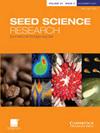环境对扁豆种子品质发育时间模式的影响
IF 1.9
3区 生物学
Q2 PLANT SCIENCES
引用次数: 2
摘要
摘要为了最大限度地延长种子的寿命,种子应该在最佳成熟期收获,也就是说,当种子在退化开始之前获得了最大的生理质量时。本研究的目的是绘制在澳大利亚谷物基因库的四个再生环境中生长的扁豆(Lens culinaris Medik)种子质量发展的时间模式的变化图,这四个环境在整个生长季节的温度和湿度控制水平不同。两种扁豆材料(76080和76072)的种子在整个发育过程中的不同阶段收获,从50%开花后21天开始,最多收获130天。在每次收获时,测定生理质量性状,包括发芽性(新鲜和干燥种子)和种子寿命,以及种子干重和水分含量。两种材料的种子,在所有环境中,在发育早期就开始积累生理品质,但直到大规模成熟后3-54天才达到最大值。干燥耐受性和储存寿命的时间模式在很大程度上受到成熟干燥阶段环境条件的影响,影响“何时”达到最大质量以及此后保持的时间。种子没有表现出典型的发育反应,而是在不同环境下生长的材料之间和内部观察到种子质量发育的变化。当两种材料的种子都生长在较冷、温度可控的温室中时,贮藏寿命最差,而76080和76072材料的贮藏寿命分别在较温暖、半保护的绿色和大冰屋环境中。本文章由计算机程序翻译,如有差异,请以英文原文为准。
Environmental effect on temporal patterns in lentil seed quality development
Abstract To maximize seed longevity, seeds should be harvested at optimal maturity, that is, when seeds have acquired maximum physiological quality before deterioration begins. The aim of this study was to map the variation in temporal patterns of lentil (Lens culinaris Medik.) seed quality development when grown across four regeneration environments, which differ in the level of temperature and humidity control throughout the growing season, at the Australian Grains Genebank. Seeds of two lentil accessions (76080 and 76072) were harvested at different stages throughout development, commencing at 21 d after 50% anthesis until a maximum of 130 d. At each harvest, physiological quality traits, including germinability (fresh and dried seeds) and seed longevity, were determined, as well as seed dry weight and moisture content. Seeds of both accessions, and in all environments, started to accumulate physiological quality early on in development but did not reach their maximum until 3–54 d after mass maturity. The temporal patterns of desiccation tolerance and storage longevity were highly influenced by the environmental conditions during the maturation drying phase, affecting both ‘when’ maximum quality was attained and for how long it was maintained, thereafter. Seeds did not show a typical developmental response, rather variation was observed in seed quality development both between and within accessions grown in the different environments. The poorest storage longevity was seen when seeds of both accessions were grown in the cooler, temperature-controlled glasshouse, and the maximum longevity was observed in the warmer, semi-protected environments of the green and the big igloo for accessions 76080 and 76072, respectively.
求助全文
通过发布文献求助,成功后即可免费获取论文全文。
去求助
来源期刊

Seed Science Research
生物-植物科学
CiteScore
3.60
自引率
4.80%
发文量
23
审稿时长
>12 weeks
期刊介绍:
Seed Science Research, the official journal of the International Society for Seed Science, is a leading international journal featuring high-quality original papers and review articles on the fundamental aspects of seed science, reviewed by internationally distinguished editors. The emphasis is on the physiology, biochemistry, molecular biology and ecology of seeds.
 求助内容:
求助内容: 应助结果提醒方式:
应助结果提醒方式:


